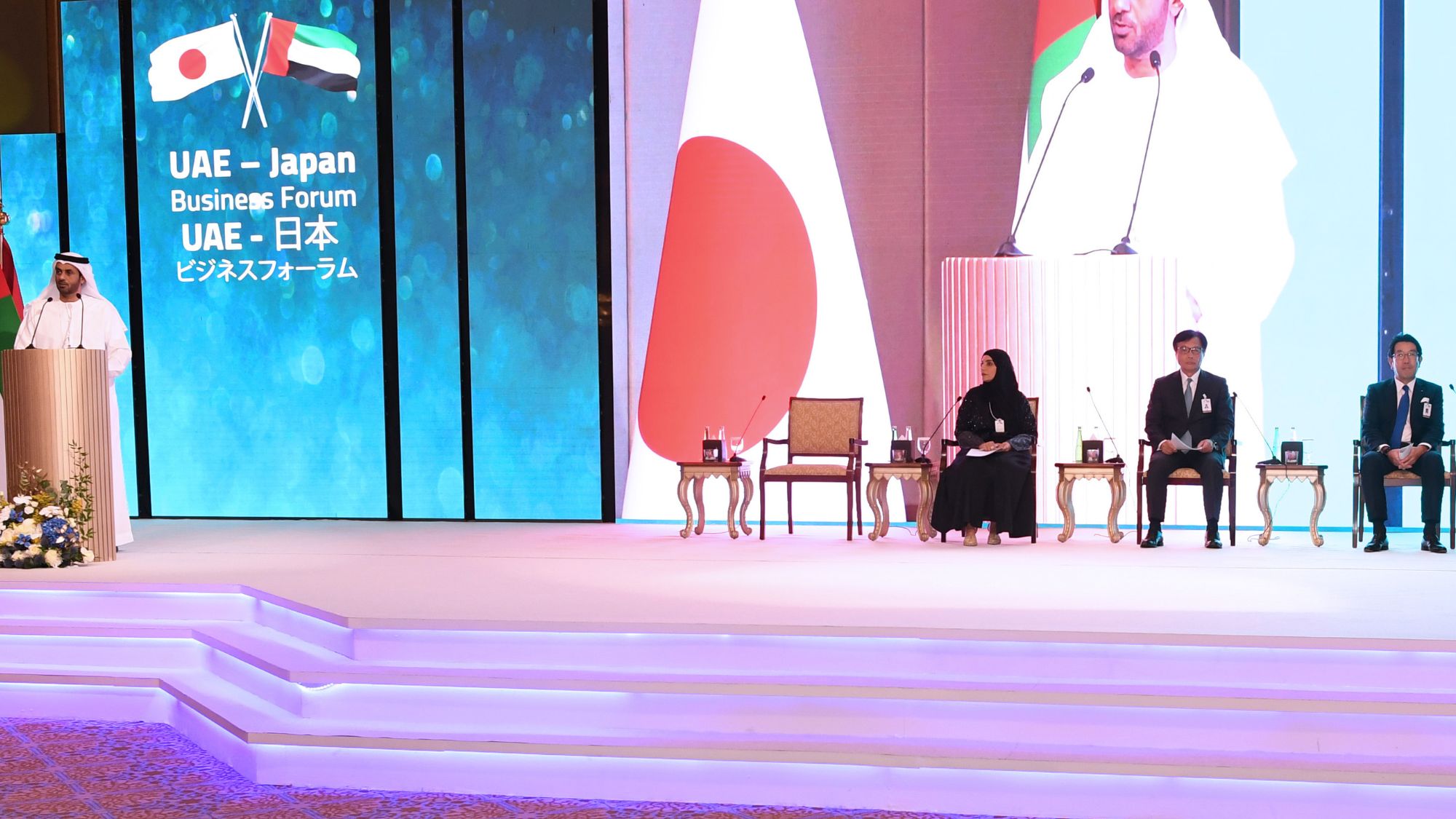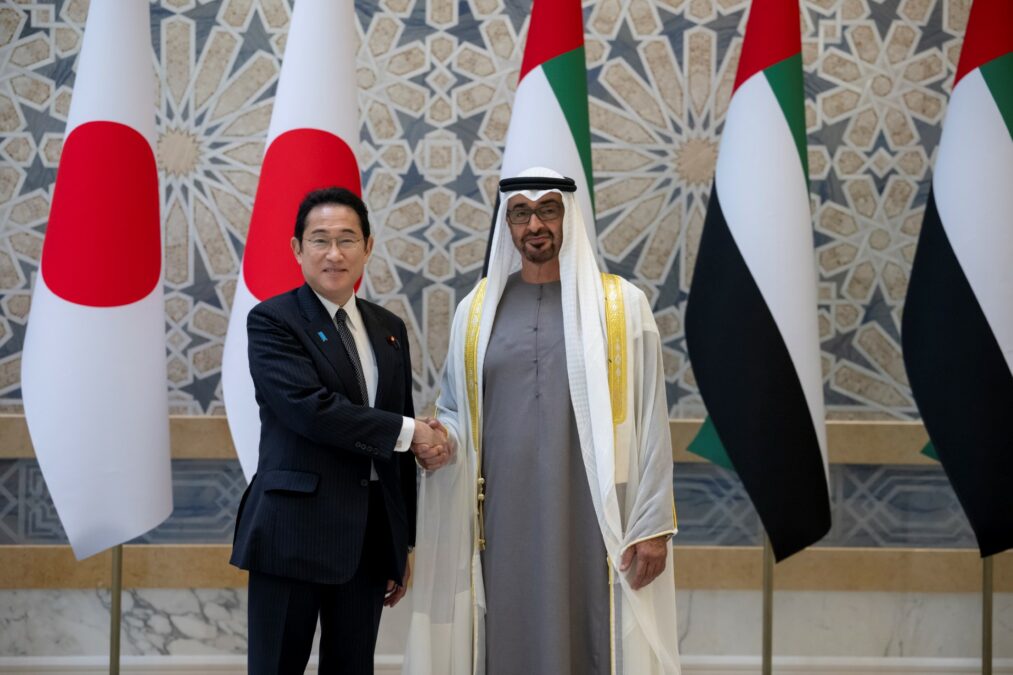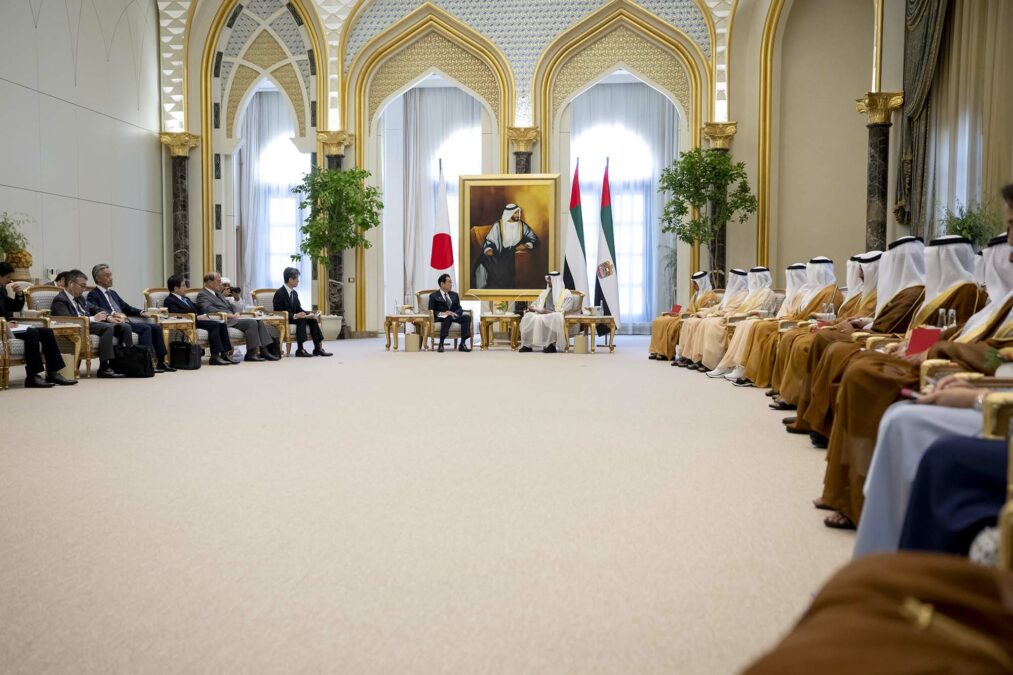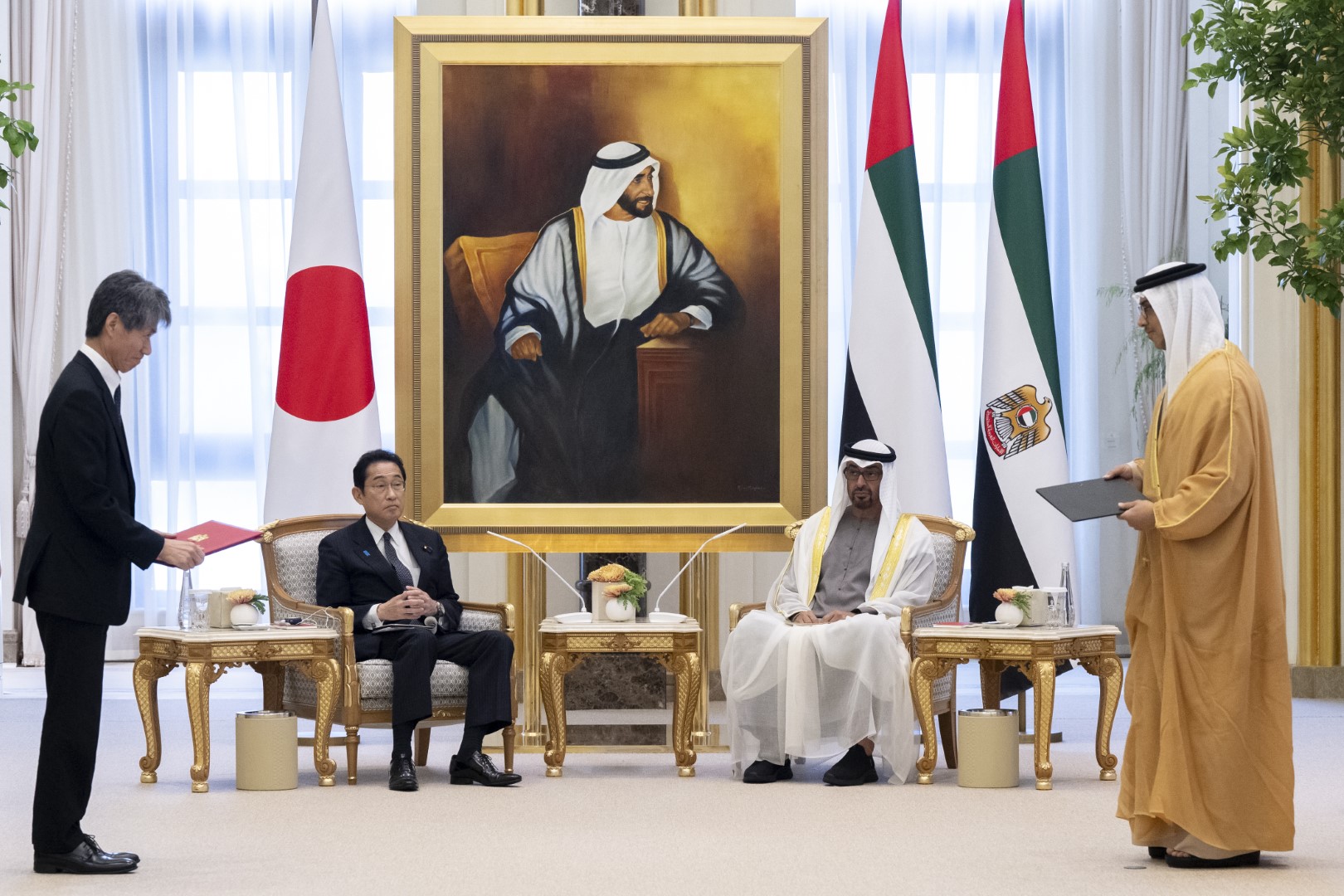Abu Dhabi (Updated) — UAE President Sheikh Mohamed bin Zayed Al Nahyan and Japanese Prime Minister Fumio Kishida on Monday witnessed a significant moment of collaboration as several Memoranda of Understanding (MoUs) and agreements were exchanged, aiming to reinforce the longstanding and robust relationship between the UAE and Japan.
The ceremony took place at Qasr Al Watan in Abu Dhabi during Prime Minister Kishida’s official visit to the UAE. These MoUs and agreements, building upon the UAE-Japan Comprehensive Strategic Partnership declared last year, were exchanged between Sheikh Mansour bin Zayed Al Nahyan, Vice President, Deputy Prime Minister, and Minister of the Presidential Court, and Yoshihiko Isozaki, Japan’s Deputy Chief Cabinet Secretary.
Key deals A Memorandum of Understanding between the UAE Ministry of Climate Change and Environment and the Japanese Ministry of Agriculture, Forestry and Fisheries, focusing on agriculture and fisheries. A Memorandum of Understanding between the UAE Ministry of Economy and the Japanese Ministry of Land, Infrastructure, Transport and Tourism, centered around tourism. A Memorandum of Understanding in the field of education between the UAE Ministry of Education and the Japanese Ministry of Education, Culture, Sports, Science and Technology. A Memorandum of Understanding between the UAE Space Agency and the Japanese Cabinet Office, the Japanese Ministry of Education, Culture, Sports, Science and Technology, and the Japanese Ministry of Economy, Trade, and Industry, pertaining to space activities for peaceful purposes. A Joint Declaration of Intent between the UAE Ministry of Industry and Advanced Technology and Japan's Ministry of Economy, Trade, and Industry, aiming to establish an Energy Security and Industry Accelerator (ESIA). A Japan-UAE Leaders' Joint Statement on Climate Action.
Additionally, various other memoranda and agreements were announced between government agencies and private entities from both nations, covering crucial sectors such as sustainability, space science, technology, the environment, renewable energy, transportation, healthcare, infrastructure, industry, and more.
This exchange of MoUs and agreements underscores the commitment of the UAE and Japan to fostering deeper cooperation and exploring new avenues of collaboration across diverse fields. The strengthened ties between the two nations are expected to pave the way for mutual growth and progress in the years to come.
Japanese Prime Minister Fumio Kishida on Monday discussed clean energy cooperation with top officials during a visit to the UAE, host of this year’s UN climate talks.
Kishida’s visit to the United Arab Emirates, which will host COP28 in November-December, is part of the first Gulf tour by a Japanese premier since the late Shinzo Abe in 2020.
The #UAE and #Japan enjoy a deep and historic bond and today we explored ways to further strengthen our Comprehensive Strategic Partnership and support sustainable global growth and stability, said @MohamedBinZayed. @MofaJapan_en @mofauae @kishida230 #UAEJapanTies #Japan pic.twitter.com/NWgimDIXdv
— TRENDS (@mena_trends) July 17, 2023
Japan relies almost entirely on imports for its crude oil, with Saudi Arabia, the UAE and Qatar accounting for the bulk of its supplies.
But as the oil-producing Gulf states move towards cleaner energy sources, especially ahead of COP28, Japan is hoping to offer its greener and renewable energy technologies to assist their decarbonization efforts.
Kishida flew in from Saudi Arabia, where he met Crown Prince Mohammed bin Salman on Sunday. After talks with UAE President Sheikh Mohammed bin Zayed Al Nahyan in Abu Dhabi, he is due to head to Qatar on Tuesday.
On Monday, Sheikh Mohammed said he held “fruitful and constructive discussions” with Kishida in Abu Dhabi on “developing bilateral relations and advancing the comprehensive strategic partnership between our two countries”.

The leaders “affirmed the commitment of both countries to enhancing cooperation on climate action, decarbonization efforts, and clean energy in the lead-up to COP28”, according to a joint statement carried by the COP28 team.
The Japanese premier later met COP28 president Sultan al-Jaber, who also heads the UAE oil giant ADNOC.
They discussed “unlocking further global cooperation to utilize more cutting-edge technologies to scale up climate action and accelerate the transition towards a net zero economy,” said a COP28 statement.
A UAE-Japanese business forum that coincided with Kishida’s visit saw Tokyo and Abu Dhabi sign 23 cooperation agreements and memoranda of understanding (MoUs). The agreements aim to bolster economic, trade and investment ties between the two countries in the fields of energy, industry, advanced technology, artificial intelligence, space, health, transport, environmental conservation and circular economy.
The signings took place in the presence of Sheikh Hamed bin Zayed Al Nahyan, Member of Abu Dhabi Executive Council, and Japanese Prime Minister Fumio Kishida.
Held within the framework of the official visit of the Japanese Prime Minister to the UAE, the forum was attended by Abdullah bin Touq Al Marri, Minister of Economy; Dr. Sultan bin Ahmed Al Jaber, Minister of Industry and Advanced Technology; Suhail bin Mohammed Al Mazrouei, Minister of Energy and Infrastructure; Dr. Thani bin Ahmed Al Zeyoudi, Minister of State for Foreign Trade; Sarah Al Amiri, Minister of State for Public Education and Advanced Technology; Jassim Mohammed Buataba Al Zaabi, Chairman of the Department of Finance and member of Abu Dhabi Executive Council and Shihab Ahmed Al Faheem, Ambassador of the UAE to Japan.
During his keynote, Bin Touq highlighted the long-standing historical ties and strategic partnership between the UAE and Japan, noting that this official visit is a key opportunity to expand the UAE-Japan comprehensive strategic partnership, building on the leading model of cooperation that the two countries have established throughout the past five decades.

Bin Touq called on Japanese businesses to leverage the facilities offered by the UAE market, which upholds the highest standards of quality, credibility and excellence, besides being a gateway to the MENA markets, offering access to a consumer base of 400 million people. The Emirati and Japanese sides affirmed the need to cooperate in establishing more partnerships in new economy sectors, which are considered drivers of sustainable development in the two countries.
Decarbonization technologies
The Japanese PM plans to offer Japan’s “cutting-edge decarbonization technologies” as part of a green energy initiative for the Middle East, he said in an open letter carried by the UAE’s official WAM news agency. Tokyo’s embassy confirmed the comments.
Under the initiative, the UAE and Japan “will be well placed to collaborate in the related fields of hydrogen and ammonia production and utilization as well as carbon recycling”, Kishida added.
As the oil-rich UAE gears up to host the COP28 United Nations climate talks, many countries remain far apart on ways to reduce fossil fuels and the global warming they cause.
“Japan will work closely with the UAE towards the success of COP28,” Kishida said.
On Sunday, he discussed energy security with senior Saudi officials including Prince Mohammed in the Red Sea city of Jeddah, official Saudi statements said.
Japan relies almost entirely on imports for its crude oil, with Saudi Arabia, the UAE and Qatar accounting for the bulk of its supplies.
“The Kingdom, based on its commitment to the strategic relationship with Japan in the field of energy, will continue to ensure the security of oil supplies to Japan,” Saudi Arabia’s Energy Minister Prince Abdulaziz bin Salman said on Sunday, in comments published on his ministry’s website.
The prime minister was due to visit Saudi Arabia, the UAE and Qatar in August last year, but he postponed the trip after contracting the coronavirus.
His trip comes at a time of deepening engagement between the region and China which brokered a shock detente between Gulf rivals Saudi Arabia and Iran in March.
50 years of ties
During his meeting with Kishida, UAE President Sheikh Mohammed bin Zayed noted that bilateral relations with Japan date back to before the foundation of the UAE, and that last year the two sides celebrated the 50th anniversary of the official establishment of diplomatic ties.
Last year also saw the announcement of the Comprehensive Strategic Partnership between the UAE and Japan, WAM reported. This agreement, Sheikh Zayed said, was a milestone that heralded the start of the next 50 years of increasing collaboration, especially in the fields of the economy, trade, technology, energy, space, and education.
The two sides discussed a number of regional and international developments, with the UAE President highlighting that the UAE and Japan share a common goal of supporting peace and stability through building bridges of cooperation and dialogue. He referenced both countries’ membership of the United Nations Security Council that works to enable further coordination to promote peace and the diplomatic resolution of conflicts worldwide.

Agreements and MoUs
The two leaders witnessed the exchange of a number of Memoranda of Understanding (MoUs) and agreements, including an MoU between the UAE Ministry of Climate Change and Environment and the Japanese Ministry of Agriculture, Forestry and Fisheries, related to the area of agriculture and fisheries.
MoUs were also signed in education and space sectors.
A Joint Declaration of Intent was signed between the UAE Ministry of Industry and Advanced Technology and Japan’s Ministry of Economy, Trade, and Industry for the establishment of an Energy Security and Industry Accelerator (ESIA).
They also witnessed the signing of Japan-UAE Leaders’ Joint Statement on Climate Action.
Further memoranda and agreements were announced between government agencies and private entities in both nations, spanning key sectors including sustainability, space science, technology, the environment, renewable energy, transportation, healthcare, infrastructure, industry, and others.
UAE-Japan non-oil trade up 36%
he non-oil trade between the UAE and Japan grew by 36 percent over the past two years from 2020 to 2022, rising from AED39.9 billion to AED54.1 billion in 2022, according to data from the Federal Competitiveness and Statistics Centre (FCSC).
This significant rise in non-oil trade reflects the strong partnership and economic cooperation between the two countries, driving their sustainable development towards further economic prosperity and growth sustainability.
Over the past ten years, from 2013 to 2022, the non-oil trade between the two countries increased from AED53.9 billion to AED54.1 billion, reaching a total of AED524.4 over a decade.
In terms of foreign trade distribution between the two countries last year, re-exports totaled AED3.4 billion, non-oil exports amounted to AED6.5 billion, and imports reached AED44.1 billion.








